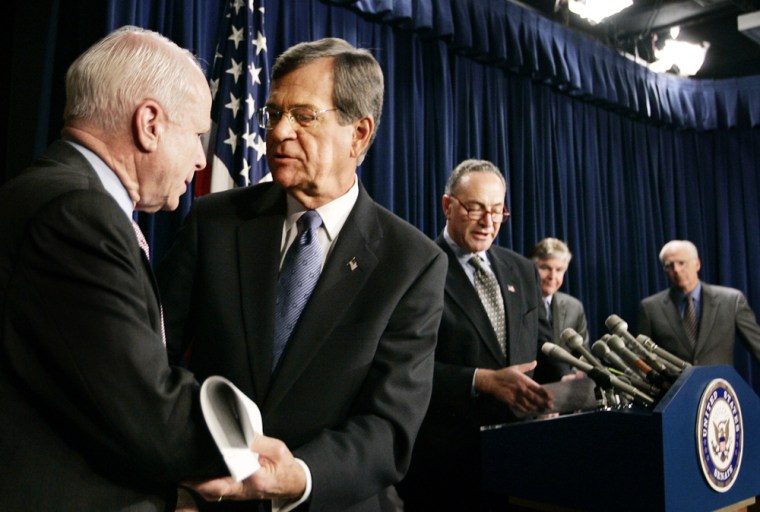Sen. John McCain and others pushing for tougher campaign finance rules won a surprising ally Wednesday as they announced a renewed effort to block partisan interest groups from spending millions of dollars in big donations in congressional and presidential races.
Sen. Trent Lott, chairman of the Senate Rules Committee, said he voted against sweeping campaign fund-raising restrictions won by McCain, Sen. Russ Feingold and others in 2002 but now agrees with the law’s supporters that further legislation is needed to stop groups from circumventing the new rules.
Lott called six- and seven-figure checks that independent political groups poured into last year’s presidential election “sewer money” that must be stopped. The Mississippi Republican said his committee would vote next month on legislation that would put strict new limits on fund-raising and spending by partisan tax-exempt groups active in congressional or presidential races.
2002 law spawns new groups
The proliferation of new groups that spent millions in the presidential race was an unintended consequence of the 2002 law that banned national party committees, and congressional and presidential candidates, from accepting big checks, Lott said. Money that used to go to the political parties simply moved to other partisan groups, he said.
“It’s been used by both sides and it’s going to be abused by both sides,” Lott said at a news conference with the bill’s sponsors.
The legislation proposed by McCain, R-Ariz., Feingold, D-Wis., Rep. Christopher Shays, R-Conn., and Rep. Martin Meehan, D-Mass., targets partisan tax-exempt groups known as 527s because of the section of the tax code that covers them.
President Bush supports the proposal, McCain said.
The legislation must win approval from Lott’s committee before the Senate can vote on it. In the House, Speaker Dennis Hastert, R-Ill., has expressed interest in limiting 527 groups’ activities but hasn’t endorsed a specific proposal, Shays said.
New rules possible for 527s
Under the measure introduced Wednesday, 527s that raise more than $25,000 a year and spend in congressional or presidential elections:
- Would have to register with the Federal Election Commission as political action committees, disclose details on their fund raising and spending, and abide by the same contribution and spending limits as other PACs. That means they could only accept donations of up to $5,000 each from individuals or other PACs for their federal election activities, contributions known as hard money.
- Could accept up to $25,000 from each individual donor to help finance efforts that affect both federal and nonfederal candidates, such as get-out-the-vote drives or ads. They would be barred from accepting money from corporations or labor unions for such spending, and would have to cover at least half the cost with the smaller “hard money” contributions.
The new proposal is similar to one made in the last Congress. It comes as a judge considers lawsuits by Shays, Meehan and the Bush campaign seeking to force the Federal Election Commission to use existing laws to limit activities of 527s.
Leveling the playing field
Bush sued the FEC last year after well-financed pro-Kerry 527s targeted him in ads. By election time, however, GOP activists had persuaded big donors to give millions for anti-Kerry ads, beginning to even the playing field among the groups.
McCain acknowledged the bill wouldn’t cover another type of interest group: lobbying and issue-advocacy organizations known as “501cs” under the tax code. He said such groups already have a big incentive to avoid partisan election activities: Getting too involved in them could jeopardize their tax-exempt status.
The bill also wouldn’t block wealthy activists from spending their money independently to air ads supporting or opposing candidates. The Supreme Court has long held that individuals have the right to spend as much as they wish on their own to express their views.
From January 2003 through late November last year, the Democratic National Committee raised $402 million for the elections and the Republican National Committee took in $385 million.
